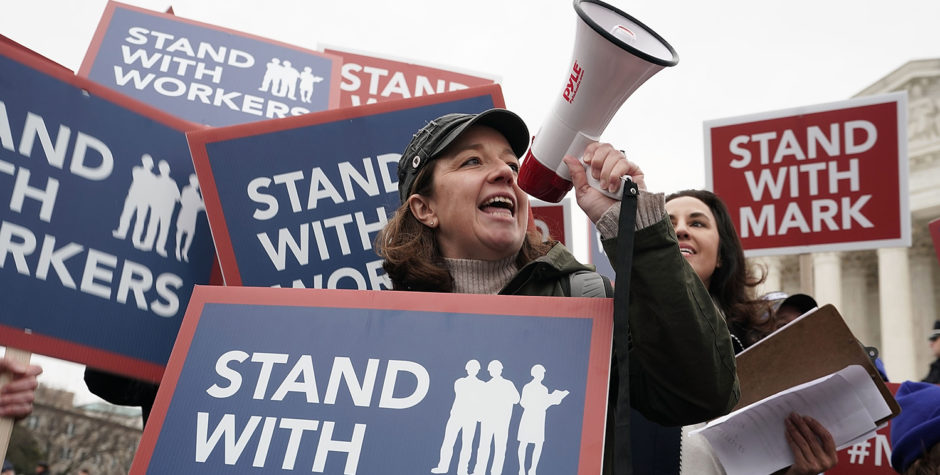A Blow to Big Labor & A Win For Free Speech At the Supreme Court
For decades public sector employees have been forced to subsidize public sector unions and their political and ideological agenda. No more. In a major victory for free speech and free association, the Supreme Court has just struck down requirements that force public sector employees to pay fees to a public-sector labor union for which they refuse to join. This is a key victory for free speech, and the ACLJ filed an important amicus brief in the case.
The Illinois Public Labor Relations Act (IPLRA), permits State and local employees to unionize. Under the law, whichever union is chosen by the majority of the employees becomes the exclusive representative for all employees. This union then becomes the only entity that can negotiate issues of pay, hours, and conditions of employment.
While federal law prohibits forcing employees to join unions, this State law required even non-members to subsidize the union by paying an agency fee that was automatically deducted from their pay checks, which was over 70% of the usual union dues anyway. They never had a choice; if they wanted to work in the public sector they had to pay this fee. Worse still, while the union said these fees would pay for the benefits the union provided them, they also subsidized the union’s political and ideological campaigns.
In short, the government was using its coercive power to compel private citizens, against their wishes and beliefs, to subsidize and support the political and ideological aims of another private organization and its members. This law was a patent violation of the First Amendment and the Court held as such.
In so holding, the Court reaffirmed that the government does not get to compel private persons to speak:
If there is any fixed star in our constitutional constellation, it is that no official, high or petty, can prescribe what shall be orthodox in politics, nationalism, religion, or other matters of opinion or force citizens to confess by word or act their faith therein. Compelling individuals to mouth support for views they find objectionable violates that cardinal constitutional command, and in most contexts, any such effort would be universally condemned. . . .
In simple terms, the First Amendment does not permit the government to compel a person to pay for another party’s speech just because the government thinks that the speech furthers the interests of the person who does not want to pay.
Likewise, the Court held that doing so is “demeaning,” “sinful,” and “tyrannical:”
When speech is compelled, however, additional damage is done. In that situation, individuals are coerced into betraying their convictions. Forcing free and independent individuals to endorse ideas they find objectionable is always demeaning. . . .
As Jefferson famously put it, “to compel a man to furnish contributions of money for the propagation of opinions which he disbelieves and abhor[s] is sinful and tyrannical.”
The Court’s language echoes our principal argument in amicus brief we filed in this case:
Government coercion of agency fees is unconstitutional because it forces an employee to support causes which that employee does not wish to support. Such coercion violates fundamental notions of liberty under the First Amendment.
This is not the first time we have fought against laws that silenced the speech of entire groups of people for political ends. In 2003, in FEC v. McConnell, ACLJ Chief Counsel Jay Sekulow defended the right of minors to give political donations to candidates they supported. The Court unanimously agreed with the ACLJ and struck down a provision of the law silencing minors, saying, “plaintiffs challenge the provision; they argue [the provision] violates the First Amendment rights of minors. We agree.”
Unfortunately, however, most decisions today are not unanimous. The Court’s rulings this past week defending our nation’s security, the free speech rights for pro-life crisis pregnancy centers, and the free speech and associational rights of public sector employees were all decided on a narrow 5-4 vote. It is a shame that four justices repeatedly failed to vote to uphold the clear and plain meaning of the Constitution and defend our fundamental freedoms. However, these cases illustrate that every vote counts both at the ballot box and on the Court.
Now, with Justice Kennedy announcing his retirement, we have a chance to ensure these major victories remain intact and are not overturned. With your help, we can fight to ensure the appointment and confirmation of a consistent constitutional conservative to the Court who will respect the laws and Constitution of the United States.
